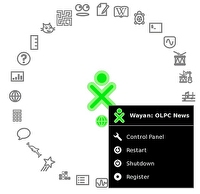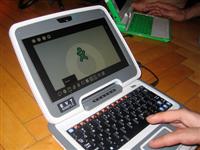A harsh criticism of Sugar from Leigh Blackall can be found at My experience with OLPC in Tuvalu. I've extracted it in part below with some acknowledgments and rebuttals.
List of things wrong with OLPCs Operating System:
1. The connectivity metaphor on start up is inappropriate for people in areas where connectivity is a long way away. The OLPC is more useful to people in Tuvalu as a device for games, media and typing before it is for connecting to the Internet, so the connectivity interface should not be the main focus at start up.
Why is the community metaphor inappropriate? It is available regardless of Internet connectivity--95% of the schools in Peru are off the Internet, and yet the children and their teachers can use Sugar to collaborate within the community. It makes a very efficient use of whatever Internet resources are available.
2. That said, we were using wireless connectivity in the Government building, but the OLPCs holding that connection was flaky. We had no trouble keeping a connection to the network on the Windows machines, but the OLPCs kept dropping. Placing a Wireless modem in the room with us seemed to help the situation. Another problem relating to connectivity was the amount of time some of the OLPCs took to connect. Some didn't at all. All of them need clearer indication of progress in connecting.
Improved wireless stability remains a goal, but the situation is much improved from Sugar 0.71, which seems to be the version of Sugar being tested (See #4 below).
3. The pop up menu for the operating system is very frustrating and seems to be affected by processing. Sometimes it is slow to initiate and even slower to disappear. I think its better to use the key on the keyboard instead, and turn off the mouse over feature.
I will conject that this comment is in regard to the hover menus. They come up instantly from a right-mouse click. But this seemed not be discoverable in the first three hours of use. A keyboard shortcut may also be a good addition.
4. Need better preloaders for the software. When we clicked an icon the software takes a while to load. Sometimes the loader dialog that says "starting" would take too long to appear. The icon does appear in the pie chart indicating active applications, perhaps something in that graphic could more effectively illustrate it as loading.
The "pie chart" comment suggests that the evaluation was done on a very old version of Sugar--pre 0.82--which makes it somewhat irrelevant. Launch time is better, but we have a ways to go.
5. The browser must have tabbed browsing! If I missed where it was, then it is too hard to find. There was no right click option on any of the OLPC we were using, and I don't know if there is meant to be. If the tabbed browsing relies on a right click then we were thwarted. Also, I think the browser needs work on its layout and features. The address bar takes up too much room and for some unknown reason wants to display the page name instead of the URL. The URL is for more useful in terms of information, and having to click into the address bar just to check the URL is just silly. The scroll bars are too small, and especially noticeable when managing a website with a scrolling window inside it, like the edit view of a wiki. We didn't try any ajax, java or flash - but I hope they are good to go!
Tabs in the Browse Activity are still on the wish list. The full address is revealed if you click in the address bar--again, apparently not readily discoverable in the first 3 hours. Java and Flash are compatible with Sugar, but there may well be performance issues on the OLPC-XO.
6. I couldn't work out how to manage files. I could download PDFs ok, but it was a bit of a fumble to display them, and I have no idea how to save them. I tried plugging in a USB but as far as I could tell, no new icon appeared offering me access, and nowhere in the browser of the PDF display could I find how to save the file to the USB.
The Browse Activity offers to open the Journal (where downloaded files are stored), but perhaps not in the older builds. The USB shows up in the Journal, but perhaps it should show up in the Frame as well, as a notification when it is inserted?
7. I wonder about the touch pad. I am used to using them and use the one on this Asus all the time, but seeing as the OLPCs are so ready to think outside the square, lets rethink the touch pad. If you didn't have the touch pad, you could have so much more room for keys! Apart from supplying a small mouse (which is infinitely more easy to use) I wonder if the game controllers in the screen could substitute a mouse, as could smart use of the tab key. That little blue dial that IBM used in the middle of their keyboard had potential I thought.
We have more work to do on keyboard shortcuts, especially on non-OLPC hardware. As regards the OLPC-XO tablet, 'nough said.
8. I reckon the operating system and software should completely change, and I'd suggest something like what Asus has done. I can certainly appreciate the innovations that I've found so far, but the extreme difference between the OLPC and other OS is too great, and will affect the usefulness of the laptops... think of it like Vista.. you are causing stress and lock in by being so different. The OLPC is not the place to experiment if your primary objective is to offer people in poorer economies to access and exploit opportunities. Of course there is the new opportunity of servicing and administering the OLPCs themselves, but that's hardly sustainable and I hope it wasn't planned for!
Growing community and jobs around Sugar is an important part of the roadmap. But also providing a platform that enhances learning is our primary concern. We've not proved our case yet, but there is plenty of evidence that a vanilla XP-approach is not having a positive impact on learning and hence is truly not a wise investment--"unlimited potential", indeed.





The 820 release immediately solved the vast majority of quibbles I had with the interface. Launching is still sometimes annoying, and the Browse activity is limited (I use Opera and get tabbed browsing, and History/bookmarking once I figure our why Opera's not saving that on exit).
This criticism sounds like it's coming from an experienced (Windows) user, and we must remember that that is not the target audience.
Walter, regarding #3, you could make the right-click functionality more discoverable in future XOs by labelling the right touchpad button (similar to the menu key on Windows keyboards).
One of the things I wish browse would do would be to tell you the path of a link on mouseover. A little pop up like the sugar interface on mouseover info boxes would work great.
I think the laptop rocks as is... the things mentioned here would be nice though!
I agree with the original criticism that the OLPC project was a very bad place for trying to create a very different / non-traditional OS.
A customized Xfce desktop would have done it nicely with simple GTK-based collaborative apps. OLPC could have concentrated on the REAL problems instead of wasting time and resources on Sugar.
Sugar really doesn't prepare the kids for computing in real life. Why learn Latin if everyone else will speak English in your working place.
Sola, would have the same argument if we were talking Leapster? No.
The XO should be thought of a learning age for young children, not a business prep laptop for teenagers.
> Sugar really doesn't prepare the kids for computing in real life
That is an OLD one!!!
Any young adult NOW would have learned Windows 95 in elementary school (10 years ago) or MS DOS (20 years ago).
What would have been in Windows 95 or Word 6 that would help these people NOW?
Zero, nothing, nada.
Nothing you know about MS Windows will help you in 10 years. And that has been true from their inception at the end of the 70's.
The exact SAME argument was used 20+ years ago to prevent schools in my country from ordering Macs.
"Children must know MS Dos to get a job".
All those children would then leave school in the mid 1990's to cash in on their MS Dos knowledge.
However, any child that would have learned to work in that niche OS, the Mac, would have had a lasting education.
Winter
> Sugar really doesn't prepare the kids for computing in real life.
The argument that we should teach children how to use proprietary software--that will be obsolete by the time they are in the job market--is tired. At the surface level, Sugar introduces the learner to the basics: word processing, browsing, creating multimedia, etc. Looking deeper, it also introduces the learner to critical thinking and collaborative processes, key to learning to learn. They are learning to deal with change and to use computing to solve the new problems they will be encountering in their lives.
Children are not office workers and in any case, office work has changed significantly since Xerox invented the desktop metaphor in the mid 70s.
It is frustrating to see my criticisms lost in misunderstanding and commented evangelism.
1. Some people elsewhere seem to be mistaking my report back as being based on an OLPC workshop. My work in Tuvalu was to give a 6 day MediaWiki user workshop. The computers used in that workshop happened to be OLPCs, and no one had any experience with them before the workshop. I think this therefore presented solid and independent user testing from the perspective of how they go in a context where no one has used OLPCs before, and some had not used computers before.
2. Some of the responses here on OLPC news to my 8 point criticism that I ended my original post with, indicate misreading of my points. Specifically point 5, where I think I pretty clearly indicate that I was aware of the click-in browser address bar option, but your response reads as though I missed that option, and that the click in option once discovered is therefore satisfactory. It isn't.
3. Thank you Sola for reinforcing my primary criticism in your comment here. Its a shame people interpret it as "Windows user not willing to change". Actually I'm a Ubuntu user, Xandros user, Windows user and Mac user with Ubuntu as my primary. In Tuvalu, there were government support people like me, but non of them could efficiently work out the OLPCs enough in the 1 day pre workshop time, to be able to effectively support the workshop using the OLPCs. My original criticism was because of that... Sugar is so new and yet still immature as to render the potential on the ground support agents impotent.. how can that be a good thing? Even if it was an older version of the OS, all that says is that that version should not have gone out and that once connected to the Internet an urgent update dialog should have appeared like it does for Ubuntu and other GNU Linux distros. I'm all for innovations on on OS! I enjoy some of Mac and Xandros work - but loath their closed development model. I despair at Windows, and I rejoice Ubuntu finally bringing GNULinux and free software within reach of your average computer user.
Sugar's design (on the premise that a computer should be designed specifically for someone else's idea of what ideal learning is) does not relate to any other operating system I have seen, and so misses a key value ad in the transferability in skills and understanding conducive to independent unsupported learning (I think). If you're going to attempt a radical innovation through the OLPCs (something I maintain should not have been attempted), and then argue that the OLPC is not a computer but a learning device, then you'd want to make sure you got it very right from the get go.. or you end up wasting energy and resources, and damaging your effort. Surely you knew you wouldn't be able to get it right! Surely you knew it wasn't right when you started distributing the OLPCs! Why you didn't just ship them with Ubuntu or Edubuntu on them is beyond me? That OS has a large community support base, would exploit the potential on the ground supports, and give you time to keep developing Sugar offline until you were sure all user testing was rock solid.
4. I want to thank you for citing my criticism on OLPC news, I am learning a lot through the feedback, I can only hope my perspective is offering you ideas and new perspective also, or at least opening up dialog that you can use constructively. I urge the people who comment here to go back to my original post to make sure you're not getting the wrong end of the stick from what OLPC news has chosen to focus on, and I hope OLPC news will continue to take on future criticisms in as diligent and objective way as possible.
To OLPC - Keep up the GREAT work, accept criticism and work with it, don't get defensive and strive to understand clearly.
Leigh,
Taking you comments in order:
1. I am glad to hear that it was a more immersive event than I had gleaned from your original article. I don't think that anyone has the expectation that users--either new to computers or experienced with other user interfaces--would not have to go through a period of discovery with a new user interface and that period of "learning" will be extensive. But is this a problem? One of the goals of Sugar was to give users a "low floor"--an easy way in--and "high ceiling"--no limit to their growth. I'd appreciate more feedback on how we can improve this approach.
2. I think we were in agreement regarding the Browse activity: tabs would be great and the URL should be more readily discoverable. Any ideas how to accomplish this? (We tried to save space by putting the title and URL into the same field.)
3. Your assertion that the Sugar "premise [is] that a computer should be designed specifically for someone else's idea of what ideal learning is" is just not true. We developed Sugar based upon 40+ years of working with technology and learning in every corner of the planet. Although the implementation is new, these are not new ideas. Sugar is not forcing an ideal of learning, but by providing affordances missing from the standard Windows or GNU/Linux desktop, we hope to skew the odds that more construction, collaboration and critique will be part of the learning experience. Unfortunately, we have seen over and over again that the standard tools don't help.
4. Please do continue to provide feedback and critique. You raised many good points in your initial post.